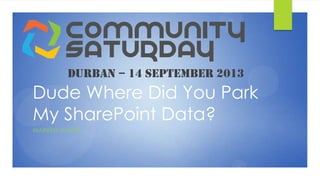SharePoint Saturday Durban Presentation
- 1. Dude Where Did You Park My SharePoint Data? WARREN MARKS DURBAN ŌĆō 14 SEPTEMBER 2013
- 3. About me Warren Marks Johannesburg Director GTconsult Over 13 years in information management First time SPS Speaker On occasion I like standing on my head @MarksWazza
- 4. Some of the topics weŌĆÖll discuss ’üĄ How does SQL store your SharePoint Data? ’üĄ What is a blob and why is it bad news? ’üĄ What is the affect of big data in SQL? ’üĄ What size should my content databases be? ’üĄ What is EBS? ’üĄ What is RBS? ’üĄ How can I offload my blobs? ’üĄ How do I pick my provider?
- 5. How SQL stores your SharePoint data ’üĄ SQL reads 8K chunks called ŌĆ£PagesŌĆØ ’üĄ Disk formatted into 1K chunks ’üĄ Fantastic database solution - not designed to store unstructured content in an optimal way
- 6. Understanding the B-L-O-B Binary large object (blob) - is a collection of binary data stored as a single entity in a database management system
- 7. The effect of the BLOB in SQL ’üĄ Bloating of SQL content databases ’üĄ Increased backup windows ’üĄ Increased recovery windows ’üĄ Increase in ŌĆ£fastŌĆØ disk storage requirements ’üĄ Increased TCO for SharePoint ’üĄ Performance degradation
- 9. How things get put back together
- 10. Content DB limitations best practices 200GB Content DB 4TB Content DB (Disk speed requirements) 500 DBŌĆÖs per farm Shredded Storage
- 11. The EBS API (SharePoint Layer) ’üĄ Supported from SharePoint 2007 SP1 & later ’üĄ Farm-wide feature (natively) ’üĄ Technology being deprecated and is not support in SharePoint 2013 External Blob Storage
- 12. The RBS API (SQL Layer) ’üĄ Supported from SQL 2008 R2 & later ’üĄ Not unique to SharePoint ŌĆō any SQL application ’üĄ Natively implemented as a content database scoped feature ’üĄ You can build your own RBS provider library Remote Blob Storage
- 14. Filestream Provider ’üĄ Can only be used on Storage local to the SQL server ’üĄ Does not bypass SQL for blob offload ’üĄ No compression ’üĄ No de-duplication ’üĄ No Encryption ’üĄ No tiered storage ’üĄ Not built as an enterprise class solution
- 15. Product NAS PPT PDF DOC DOC DOC DOC TIFF XLS NAS Azure Azure JBOD PDFDOC XLS PDF TIFF AVI DOCPPTXLSTIFFPDF +1 year +2 years Azure DOCDOC +5 years Less relevant content becomes less-expensive to store Blob Offloader
- 16. Filestream Provider vs Product Feature RBS FILESTREAM Product BLOB Externalization ’ā╝ ’ā╝ Offload BLOBs to remote (NAS, CAS, or Cloud) storage platforms ’ā╗ ’ā╝ Outbound BLOB cache for off-premises (i.e. Cloud) operations ’ā╗ ’ā╝ Define multiple storage locations per content database ’ā╗ ’ā╝ Filter endpoints by file type or scope (i.e. list or content type) ’ā╗ ’ā╝ Use SharePoint filename or folder on offloaded BLOBs ’ā╗ ’ā╝ Promote SharePoint properties to endpoint ’ā╗ ’ā╝ Securely delete (shred) BLOBs ’ā╗ ’ā╝ Report and Health Monitor Dashboard ’ā╗ ’ā╝ Administration User Interface ’ā╗ ’ā╝ PowerShell Support ’ā╗ ’ā╝ Compression ’ā╗ ’ā╝ Encryption ’ā╗ ’ā╝ (Transmission and "at restŌĆ£) Tiered Storage (HSM) support ’ā╗ ’ā╝ Move BLOBs to less expensive tiers of storage based on admin-defined aging rules ’ā╗ ’ā╝ Move BLOBs to less expensive tiers of storage based on admin-defined retained versions rules ’ā╗ ’ā╝ Move BLOBs to less expensive tiers of storage based on admin-defined metadata change rules ’ā╗ ’ā╝ Orphaned BLOB Garbage Collection ’ā╝ (Basic ) ’ā╝’ā╝
- 17. Picking your provider ’üĄ Microsoft Gold ISV Partner ’üĄ Installed into a Fortune 500 Company ’üĄ Track Record ’üĄ Gartner Recognition ’üĄ Administrator Recognition ’üĄ POC!!!!
- 18. Top 5 Reasons for using RBS ’üĄ Rapid content growth ’üĄ Performance issues ’üĄ Realize cost savings ’üĄ Risk mitigation ’üĄ Develop a more agile storage strategy
- 19. Final Goal
- 20. Q & A
- 21. Takeaways ’üĄ Contact me @MarksWazza warren@gtconsult.co.za





















